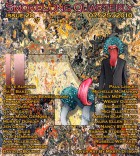I think you told me this is your first published flash. Yes? Do you like writing short-short stories? If so, why? If not, why not?
Yes, this is my first published flash. I enjoyed writing “Frank,” but I rarely try my hand at flash. I’m just not able to truncate a story into 1,000 words or less, and I’m not lyrically gifted enough to go the poetic/metaphor route. So I think I’m more suited for longer fiction. That said, I really enjoy reading flash. Meg Pokrass and Kathy Fish and all the Queens of Flash—seems to be a female-dominated genre, doesn’t it? Which also might explain why I like reading it so much.
Flash is a female-dominated genre? Ooo, them’s fightin’ words! But … let’s change the subject, shall we? Hey, speaking of women, is your wife really Russian? Do you really have a teenage daughter? One of the reasons I like this story is that it has a teenage daughter in it, and she never wants to be at home. I like this verisimilitude. If you don’t have a teenage daughter, how do you know so much about them?
My wife is not Russian. No kids. I’ve happily surrounded myself with women my entire life and I’m a keen observer so that’s probably why I’m responsive to teenage girls’ plight. Although I think most teenagers—boys and girls— see home as the enemy and will do anything to stay away. I know I did.
Do you like your first name? I like the name “Matt,” but it seems like there are a jillion freakin’ Matts these days. Everywhere you go, there’s a Matt. If your name wasn’t Matt, what would you want it to be?
Matt’s a great name and I’m perfectly satisfied with it. For whatever reason when I was seven or eight years old I thought it would’ve been cool to have the name Rick. I thought Rick was a name that had a lot of torque. But after that, I don’t think I ever thought about my name again.
About your narrator: What is this guy’s deal? Did he always have such a bad attitude? The wife seems nice, but he’s always trying to pick a fight with her. Was he always like this, or is he going through some sort of crisis?
I think he’s stuck or stifled somehow. It’s probably a fairly generic portrait of a mid-life or nearing mid-life crisis of some form. His daughter has disappeared, he and his wife have probably been married long enough to start resenting each other a little, and he’s looking for a way out. Not necessarily a way out of his marriage and his present life, but an escape valve, something to elevate him above the ordinary. And perhaps changing his name is the fix for this malady.
And is changing one’s name to Andy really going to help anything? I don’t think changing one’s name to Andy ever helped anyone. Maybe Andrew. But not Andy. Discuss.
It’s largely a weak metaphor for anyone who is searching for a superficial or short-term fix for whatever is ailing them. Whether it’s a car, purse, job promotion, moving to new city, plastic surgery, the name in this instance works the same way; if only the narrator can change his name then his life will be what it “should be” or what he imagines it should be. We live in a culture where everyone thinks they “deserve” something; that by default of being born, we, as individuals, “deserve” happiness and the like, for example; and marketers and people like Oprah no doubt promote and exploit this idea every day. In Frank’s case, thankfully, he’s not out any great expense or life alteration, so hopefully he’ll learn soon enough that his problem will require a different kind of solution.
Do you find it annoying to explain your fiction to dumb-asses who don’t get it?
No, not at all. I’m flattered that someone would read my work and feel moved or intrigued enough to want to ask me questions.



 The SmokeLong Grand Micro Contest (The Mikey) is now an annual competition celebrating and compensating the best micro fiction and nonfiction online.
The SmokeLong Grand Micro Contest (The Mikey) is now an annual competition celebrating and compensating the best micro fiction and nonfiction online.